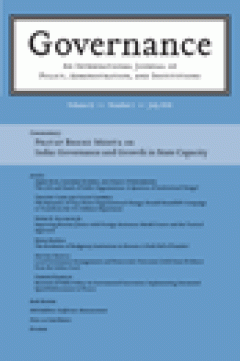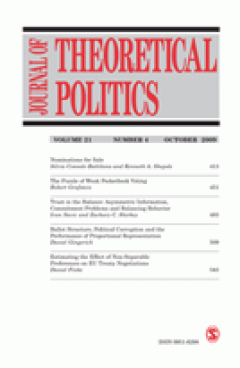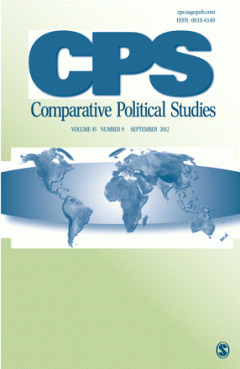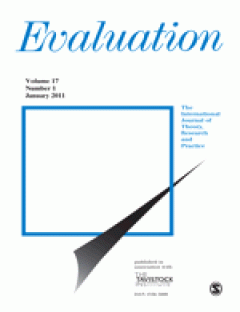Filter by

Kerala's Ombudsman : A Mismatch of Mission and Capabilities
India, like many developing nations, has adopted many accountability institutions. One of these is the ombudsman. Originally a Swedish invention, ombudsman's offices were adopted by many countries over the last 50 years. Recently, the South Indian state of Kerala has instituted an ombudsman's office. While it has had notable successes in resolving minor cases related to local government institu…
- Edition
- Volume 24, Issue 2, April 2011, pages 389–392
- ISBN/ISSN
- 09521895
- Collation
- -
- Series Title
- Governance
- Call Number
- -

A model of non-informational preference change
According to standard rational choice theory, as commonly used in political science and economics, an agent�s fundamental preferences are exogenously fixed, and any preference change over decision options is due to Bayesian information learning. Although elegant and parsimonious, such a model fails to account for preference change driven by experiences or psychological changes distinct from inf…
- Edition
- Vol. 23 no. 2, April 2011.pp. 145-164
- ISBN/ISSN
- 09516298
- Collation
- -
- Series Title
- Journal of Theoretical Politics
- Call Number
- -

Paradox lost : Explaining and modeling seemingly random individual behavior i…
Despite a large body of experimental data demonstrating consistent group outcomes in social dilemmas, a close look at individual behavior at the micro level reveals a more complicated story. From round to round, individual behavior appears to be almost random. Using a combination of formal deduction and agent-based simulations, we argue that any theory of individual choice that accounts for the…
- Edition
- Vol. 23 no. 2, April 2011.pp. 165-187
- ISBN/ISSN
- 09516298
- Collation
- -
- Series Title
- Journal of Theoretical Politics
- Call Number
- -

Coordination dilemmas and the valuation of women in the U.S. Senate : Reconsi…
We offer a model of colleague valuation to illuminate the coordination challenges women legislators face. Our model predicts that women members� strategies depend upon whether they value women colleagues as much as men do, or instead value fellow women colleagues more highly. We test these predictions by analyzing leadership PAC campaign contributions U.S. Senators made to incumbent and challen…
- Edition
- Vol. 23 no. 2, April 2011.pp. 188-214
- ISBN/ISSN
- 09516298
- Collation
- -
- Series Title
- Journal of Theoretical Politics
- Call Number
- -

The origins of social institutions
How do individual agents enact the institutions that govern collective behavior in a social situation? How do individuals come to share self-enforcing expectations about collective behavior, so that societal rules and constraints have an effect on individual choice? Conventional accounts, such as contract and evolutionary theories or the analysis of conventions and social conflict, cannot expla…
- Edition
- Vol. 23 no. 2, April 2011 .pp. 215-240
- ISBN/ISSN
- 09516298
- Collation
- -
- Series Title
- Journal of Theoretical Politics
- Call Number
- -

Majorities with a quorum
Based on a general model of the �quaternary� voting rule, sensitive to voters� choices between four different options (abstaining, voting �yes�, voting �no� and staying at home), we systematically study different types of majority and quorum. The model allows for a precise formulation of majority rules and quorum constraints. For such rules four types of majority can be defined. We also conside…
- Edition
- Vol. 23 no. 2, April 2011.pp. 241-259
- ISBN/ISSN
- 09516298
- Collation
- -
- Series Title
- Journal of Theoretical Politics
- Call Number
- -

On the buyability of voting bodies
We study vote buying by competing interest groups in a variety of electoral and contractual settings. While increasing the size of a voting body reduces its buyability in the absence of competition, we show that larger voting bodies may be more buyable than smaller voting bodies when interest groups compete. In contrast, imposing the secret ballot is an effective way to fight vote buying in the…
- Edition
- Vol. 23 no. 2, April 2011.pp. 260-287
- ISBN/ISSN
- 09516298
- Collation
- -
- Series Title
- Journal of Theoretical Politics
- Call Number
- -

Cross-Cutting Issues and Party Strategy in the European Union
Has European integration affected national electoral politics beyond the margins? Experts describe its main impact as empowerment of radical voices. Mainstream parties avoid European Union (EU) issues that divide their left-or right-based organizations; extreme parties attack the EU and the center�s silence. But EU issues also generate important dynamics inside mainstream parties. The authors t…
- Edition
- Vol. 44 no. 4, April 2011.pp. 383-411
- ISBN/ISSN
- 00104140
- Collation
- -
- Series Title
- Comparative Political Studies
- Call Number
- -

Capitalist Systems, Deindustrialization, and the Politics of Public Education
Recent years have seen a number of studies on the determinants of educational spending. Almost all of the existing work emphasizes the importance of left-wing governments as a motor of expansion because such expansion allegedly ensures both redistribution and the facilitation of a supply-side economy. The existing literature thereby corroborates the power resource theory. Against this common wi…
- Edition
- Vol. 44 no. 4, April 2011.pp. 412-435
- ISBN/ISSN
- 00104140
- Collation
- -
- Series Title
- Comparative Political Studies
- Call Number
- -

Remote Control : How the Media Sustain Authoritarian Rule in China
This study examines the role of the media in sustaining regime stability in an authoritarian context. The article engages the recent work on authoritarian resilience in comparative politics but goes beyond the standard focus on elections to other important institutions, such as the media and courts, that are used by authoritarian leaders to bolster legitimacy. The authors find that the Chinese …
- Edition
- Vol. 44 no. 4, April 2011.pp. 436-467
- ISBN/ISSN
- 00104140
- Collation
- -
- Series Title
- Comparative Political Studies
- Call Number
- -

To Call or Not to Call? Political Parties and Referendums on the EU’s Const…
Why did some political parties in the EU member states support and others oppose a facultative referendum on the Constitutional Treaty? The authors argue that electoral competition played a major role in determining how parties positioned themselves with respect to the desirability of a referendum. Parties that expected electoral gains supported and those that expected electoral losses opposed …
- Edition
- Vol. 44 no. 4, April 2011 .pp. 468-492
- ISBN/ISSN
- 00104140
- Collation
- -
- Series Title
- Comparative Political Studies
- Call Number
- -

Homing in on excellence : Dimensions of appraisal in Center of Excellence pro…
Excellence has become a watchword for goal setting and assessment in science and technology policy. While the concept has been around for many years in its commonsense meaning, it is now explicitly used for science governance; however, so far little work has been done to detail, operationalize and systematize the dimensions of value present in academic evaluators� use of the concept. This artic…
- Edition
- Vol. 17 no. 2, April 2011.pp. 117-131
- ISBN/ISSN
- 13563890
- Collation
- -
- Series Title
- Evaluation
- Call Number
- -

Synthesis in policy impact assessment
Impact evaluators of large-scale and multi-domain policy proposals have had difficulties in aggregating detailed assessment results into summative evaluative conclusions. Assumptions about how to aggregate impacts from micro to macro level across multiple evaluation domains (economic, social, natural environment) differ and different approaches produce different end results. An aggregation prob…
- Edition
- Vol. 17 no. 2, April 2011.pp. 133-150
- ISBN/ISSN
- 13563890
- Collation
- -
- Series Title
- Evaluation
- Call Number
- -

The limited scope of policy appraisal in the context of referendum democracy …
The article investigates how the specific political system context shapes the effectiveness of policy appraisals. Based on a single case study on Regulatory Impact Assessment (RIA) in Switzerland, we argue that the meager impact and success of the RIA is due to its institutional context, namely Swiss semi-direct referendum democracy. Direct democratic involvement and the division of power in th…
- Edition
- Vol. 17 no. 2, April 2011 .pp. 151-163
- ISBN/ISSN
- 13563890
- Collation
- -
- Series Title
- Evaluation
- Call Number
- -

The logic of evaluation professionalism
This article draws on the sociological literature to (i) explore the intersection between evaluation and professionalism; (ii) identify the extent to which evaluation fulfills the main attributes of professionalism; (iii) apply logical models of professionalism to the practice of independent and self-evaluation; and (iv) speculate about the future of the discipline. It rests the case for evalua…
- Edition
- Vol. 17 no. 2, April 2011.pp. 165-180
- ISBN/ISSN
- 13563890
- Collation
- -
- Series Title
- Evaluation
- Call Number
- -

Realistic evaluation as an avenue to learning for development NGOs
The rise of evidence-based policy-making has created pressures on the evaluation activities of Non-Governmental Organizations (NGOs). In tandem with the demands from outside, NGOs themselves have improved their evaluation activities due to their own desire to learn. This article was motivated by the reflections of Finnish development NGOs on their need to elaborate new approaches. The NGOs have…
- Edition
- Vol. 17 no. 2, April 2011.pp. 181-192
- ISBN/ISSN
- 13563890
- Collation
- -
- Series Title
- Evaluation
- Call Number
- -

The welfare of now and the green (post) politics of the future
This paper examines how key differences in the very manner in which the environment/welfare nexus is experienced and understood in both the global North and the global South are managed in favour of the former over the latter. We show how in the case of the global North � the more affluent world, such as Britain � environmental issues have been usually construed as post-materialist and/or post-…
- Edition
- Vol. 31 no. 2, May 2011.pp. 174-193
- ISBN/ISSN
- 02610183
- Collation
- -
- Series Title
- Critical Social Policy
- Call Number
- -

How do radical climate movements negotiate their environmental and their soci…
This is a case study of the Camp for Climate Action, which has held several high-profile protest events in the UK since its inception in 2006. It analyses the Camp as a contested space where different emphases on environmental and social priorities have to be negotiated by its activists. The article considers areas of contestation where concerns over climate change meet questions of social just…
- Edition
- Vol. 31 no. 2, May 2011.pp. 194-215
- ISBN/ISSN
- 02610183
- Collation
- -
- Series Title
- Critical Social Policy
- Call Number
- -

Flood risk, vulnerability and environmental justice : Evidence and evaluation…
Flooding has only relatively recently been considered as an environmental justice issue. In this paper we focus on flooding as a distinct form of environmental risk and examine some of the key evidence and analysis that is needed to underpin an environmental justice framing of flood risk and flood impacts. We review and examine the UK situation and the body of existing research literature on fl…
- Edition
- Vol. 31 no. 2, May 2011.pp. 216-240
- ISBN/ISSN
- 02610183
- Collation
- -
- Series Title
- Critical Social Policy
- Call Number
- -

Environmental justice in Cuba
�Environmental justice� refers to the human right to a healthy and safe environment, a fair share of natural resources, access to environmental information and participation in environmental decision-making. Some analysts have argued that environmental justice is undermined by the political economy of capitalism. This paper builds on this analysis by evaluating the environmental justice situati…
- Edition
- Vol. 31 no. 2, May 2011.pp. 241-265
- ISBN/ISSN
- 02610183
- Collation
- -
- Series Title
- Critical Social Policy
- Call Number
- -
 Computer Science, Information & General Works
Computer Science, Information & General Works  Philosophy & Psychology
Philosophy & Psychology  Religion
Religion  Social Sciences
Social Sciences  Language
Language  Pure Science
Pure Science  Applied Sciences
Applied Sciences  Art & Recreation
Art & Recreation  Literature
Literature  History & Geography
History & Geography